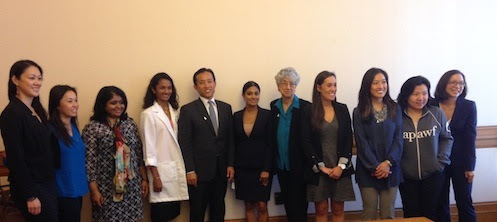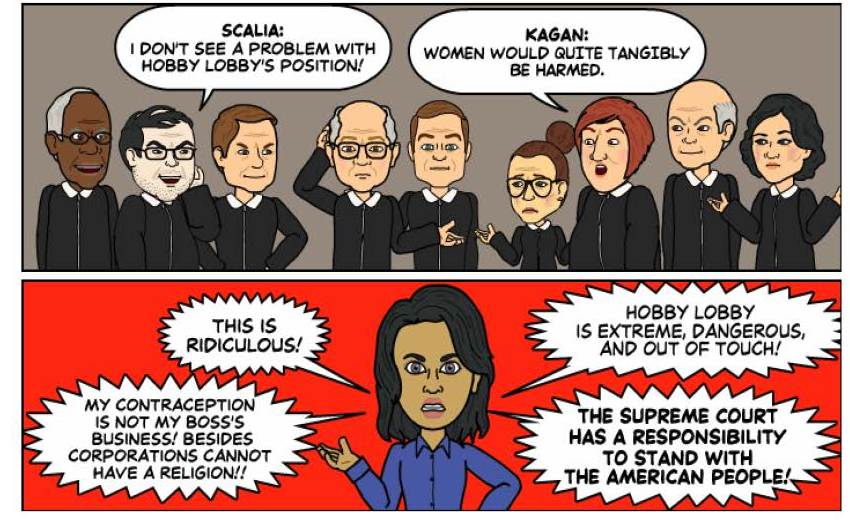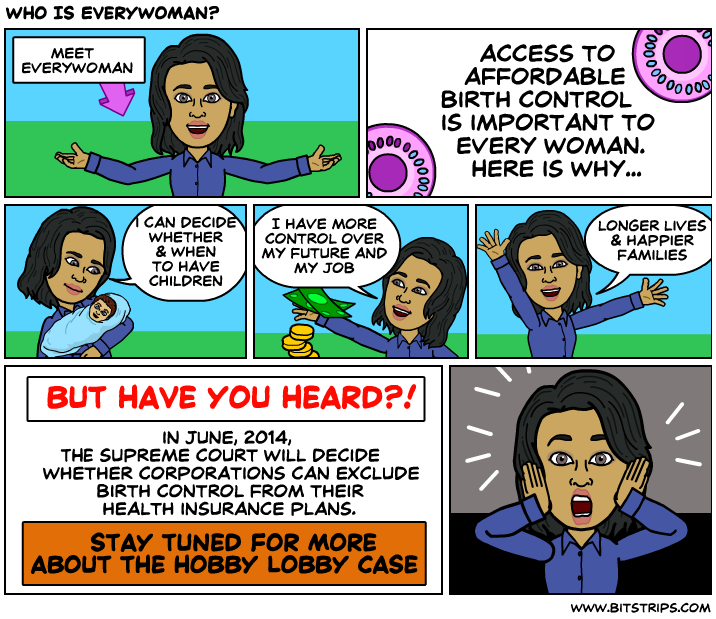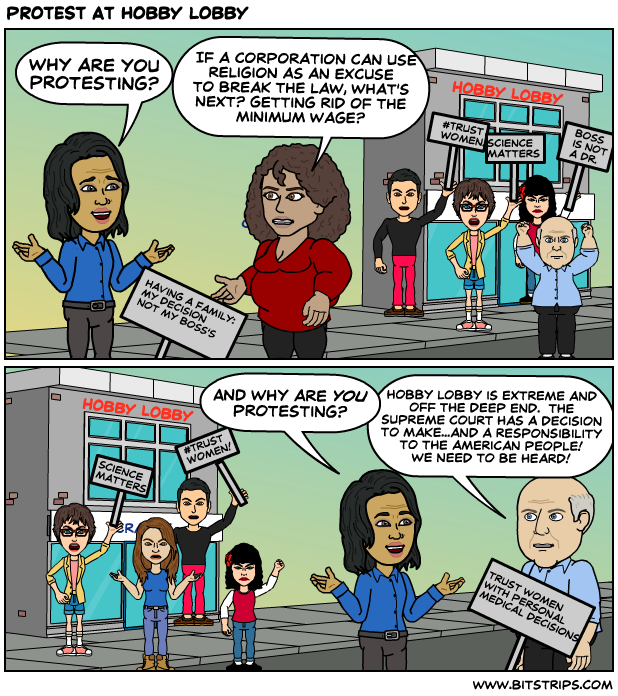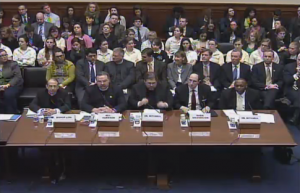
#EveryWoman at the Supreme Court
#EveryWoman
As the Supreme Court Justices deliberate, #EveryWoman aims to make sure that they know the mainstream views and practices of Americans regarding birth control. Women’s access to affordable contraception, that is responsive to each woman’s health and life conditions, is a fundamental right with widely accepted health benefits.
Public discussions around the Hobby Lobby and Conestoga Wood cases have sometimes been shrouded in technical debates over interpretations of the Religious Freedom Restoration Act.
In the words of Justice Kagan, regarding the Affordable Care Act: Congress has given a statutory entitlement and that entitlement is to women and includes contraceptive coverage.
Whatever the Court decides, the Trust Women/Silver Ribbon Campaign and our supporters aim to assure that this access continues.
The Hobby Lobby Case
The Affordable Care Act as adopted in 2010 required all health insurance plans to cover contraception as a preventive health benefit for women, without any additional copayments or deductibles. But some religious groups opposed this provision, primarily the U.S. Conference of Catholic Bishops and some evangelical Christian groups. The final regulations issued in 2013 provided exemptions from the contraception coverage mandate to a wide assortment of employers, including those that admittedly hire employees of other faiths. Numerous private employers followed suit by seeking an exemption from the law, based on the religious beliefs of the owners. Lower courts issued a variety of conflicting rulings. The Supreme Court agreed to hear the case presented by two such corporations, Hobby Lobby and Conestoga Wood. The case was presented on March 25, 2014, and a decision is expected towards the end of June.
The owners of these 2 for-profit corporations assert that their personal religious beliefs are also held by their corporations. Those beliefs compel them to want to offer health insurance to their employees, and they agree to include coverage of contraceptives. However, their beliefs also include opposition to abortion. They mistakenly believe that certain contraceptives cause abortions, in preventing a fertilized egg from implanting in the uterus wall. Science has shown that, instead, these methods prevent fertilization. If Hobby Lobby and Conestoga Wood can legitimately avoid following the law due to these claims, it could destabilize a range of other laws.
Selected excerpts from the transcript of the hearing in March demonstrate the Justices’ range of views.
JUSTICE KAGAN: Justice Sotomayor is quite right that there are quite a number of medical treatments that different religious groups object to. So one religious group could opt out of this and another religious group could opt out of that and everything would be piecemeal and nothing would be uniform. (p.6)
JUSTICE KAGAN: But, again, Mr. Clement, as Justice Ginsburg said, this was a very uncontroversial law. Your understanding of this law, your interpretation of it, would essentially subject the entire U.S. Code to the highest test in constitutional law, to a compelling interest standard. So another employer comes in and that employer says, I have a religious objection to sex discrimination laws; and then another employer comes in, I have a religious objection to minimum wage laws; and then another, family leave; and then another, child labor laws. And all of that is subject to the exact same test which you say is this unbelievably high test, the compelling interest standard with the least restrictive alternative. (p.14)
JUSTICE KAGAN: Well, with respect, Mr. Clement, I think that … the Court has had a different understanding of what the Religious Freedom Restoration Act does and the kind of analysis that it requires courts to perform than you’re arguing for in this case. …if your argument were adopted and there was a strict scrutiny standard of the kind that usually applies and a least restrictive alternative requirement, then you would see religious objectors come out of the woodwork with respect to all of these laws. And because you say — and I think this is absolutely right when you say it — that you cannot test the centrality of a belief to a religion, you cannot test the sincerity of religion. I think a court’s hands would be bound when faced with all these challenges if your standard applies. (p.16)
JUSTICE KAGAN: But Mr. Clement, it’s not saying you must do something that violates your religion. It’s giving you a choice. You can do this thing or if this thing violates your religion you can do another thing. And that other thing is approximately the same price as the thing that you don’t want to do. (p.25)
JUSTICE KAGAN: I mean, Mr. Clement, isn’t that just a way of saying that you think that this isn’t a good statute, because it asks one person to subsidize another person. But Congress has made a judgment and Congress has given a statutory entitlement and that entitlement is to women and includes contraceptive coverage. And when the employer says, no, I don’t want to give that, that woman is quite directly, quite tangibly harmed. (p.37)
JUSTICE GINSBURG: It would make no difference if it were — there are 20 FDA-approved contraceptives, all of them covered by the Healthcare Act. (p. 38)
JUSTICE GINSBURG: You picked out, in one case, three, and the other case four? Suppose the employer says contraceptives all together are against my religion, so I’m not going to give any contraceptive coverage. (p. 38)
JUSTICE GINSBURG: But your argument, it seems to me, would apply just as well if the employer said no contraceptives.
JUSTICE SOTOMAYOR: Is your claim limited to sensitive materials like contraceptives or does it include items like blood transfusion, vaccines? For some religions, products made of pork? Is any claim under your theory that has a religious basis, could an employer preclude the use of those items as well? (p.4)
JUSTICE SOTOMAYOR: How does a corporation exercise religion? I mean, I know how it speaks and we have, according to our jurisprudence, 200 years of corporations speaking in its own interests. But where are the cases that show that a corporation exercises religion? (p.18)
JUSTICE SOTOMAYOR: So the dissent in this case, in the Tenth Circuit case, said how do we determine when a corporation has that belief? Who says it? The majority of shareholders? The corporate officers? The — is it 51 percent? What happens to the minority? And how much of the business has to be dedicated to religion? 5 percent? 10 percent? 90 percent? Just assume not a business like yours – you picked great plaintiffs, but let’s assume — Let’s assume just a business that sells 5 percent of religious books, doesn’t play Christmas music, doesn’t give off – works on Sunday, you know, does nothing else religiously. (p.18)
JUSTICE SOTOMAYOR: Is there — a different way of looking at it, the leeway? In U.S. v. Lee, we said, “When followers of a particular sect enter into a commercial activity as a matter of choice, the limits they accept on their own conduct as a matter of conscience and faith are not to be superimposed on the statutory schemes which are binding on others in that activity.” So isn’t that really the answer, that we’ve never considered a for-profit corporation as exercising religion? (p.20-21)
CHIEF JUSTICE ROBERTS: I thought that part of the religious commitment of the owners was to provide health care for its employees.
JUSTICE SOTOMAYOR: Well, if they want to do that, they can just pay a greater salary and let the employees go in on the exchange. (p.23)
JUSTICE SOTOMAYOR: May I just put a footnote on this. I thought the average price of providing insurance for a single person is $4,000, and it’s $12,000 for a family — for a family. So the $2,000 tax — that’s what it’s called — is to help the government provide subsidies to people on the exchange that don’t have employer insurance. So it’s a tax because it is to do exactly what your client wants, to get the government to supply the contraceptives, not the insurance companies. (p. 26)
JUSTICE SOTOMAYOR: Counsel, one of the attorneys below on behalf of your clients admitted that the grandfathered policies weren’t going to be around very long because any change to an existing policy [terminates such plans] — and he said these changes happen on a yearly basis. And we already know from the government’s statistics that up to 40 percent now have grandfathered out. Your own client changed its policy, and that’s why it’s not grandfathered. And he changed it to drop contraceptives it was covering. (p.31)
JUSTICE SOTOMAYOR: I’m not sure that squares with Lee. The statute created the right to Social Security, and there the Court said you can’t deprive employees of a statutory right because of your religious beliefs. So Lee is contrary to the point you’re making. (p.35)
JUSTICE SOTOMAYOR: So we go back to the start of my question, that would be essentially the same for vaccines, blood transfusions, non-pork products, the government has to pay for all of the medical needs that an employer thinks or claims it has a religious exemption to? (p.84)
CHIEF JUSTICE ROBERTS: Isn’t that what we are talking about in terms of their religious beliefs? One of the religious beliefs is that they have to pay for these four methods of contraception that they believe provide abortions. (p.76)
JUSTICE SCALIA: There is not a single case which says that a for-profit enterprise cannot make a freedom of religion claim, is there? (p.50)
JUSTICE SCALIA: You’re talking about, what, three or four birth controls, not all of them, just those that are abortifacient. That’s not terribly expensive stuff, is it? (p.66)
JUSTICE ALITO: What about the implications of saying that no for-profit corporation can raise any sort of free exercise claim at all and nobody associated with the for-profit corporation can raise any sort of free exercise claim at all?
Let me give you this example. According to the media, Denmark recently prohibited kosher and halal slaughter methods because they believe that they are inhumane. Now, suppose Congress enacted something like that here. What would a corporation that is a kosher or halal slaughterhouse do? They would simply — they would have no recourse whatsoever. They couldn’t even get a day in court. They couldn’t raise a RFRA claim. They couldn’t raise a First Amendment claim. (p.78)
The Supreme Court
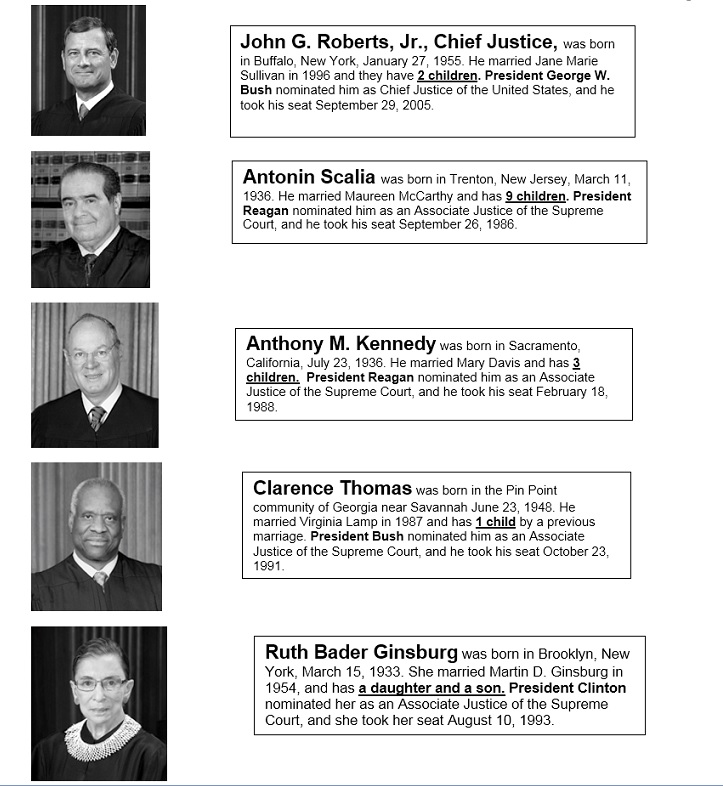

Supreme Court Basics
The Supreme Court includes 9 justices, appointed for life. Each Justice is nominated by the president who is in office at the time a vacancy occurs, usually due to the resignation or death of another justice, and must be approved by a vote of the Senate.
The Court is part of the judiciary, one of the three branches of the U.S. government. The other two branches are the Executive (president, who appoints the heads of U.S. agencies, such as the Dept. of Health and Human Services); and the legislature, including Congress.
The role of the Supreme Court is to decide whether particular laws or regulations adopted by local, state or federal legislatures or regulatory authorities are consistent with the U.S. Constitution.
Supreme Court decisions have played a key role in expanding access to contraception and abortion. In Griswold v. Connecticut in 1965, the court found that the Constitution protected a right to privacy, striking down a state law that restricted unmarried people from obtaining contraceptives, followed by the Roe v. Wade decision in 1973, that legalized abortion.
The Justices are supposed to be nonpartisan. They are generally considered to be divided on reproductive rights.
All of the Justices who are married appear to have used contraception regularly, as each has 3 or fewer children, except for Scalia, who has 9. (details below.) http://www.supremecourt.gov/about/biographies.aspx
* See and Share EveryWoman on Facebook
* Follow #EveryWoman on Twitter
* Tweet about why access to affordable contraception is important, and share it with all of your followers. Use #EveryWoman, and tell @SCOTUS and @oursilverribbon!
* Advocate Action: Sign and comment on our PETITION
